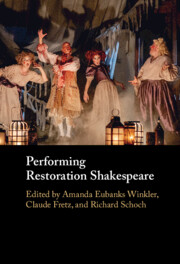Book contents
- Performing Restoration Shakespeare
- Performing Restoration Shakespeare
- Copyright page
- Contents
- Figures
- Tables
- Music Examples
- Notes on Contributors
- Foreword
- Acknowledgements
- Abbreviations
- Introduction: New Shakespeare for a New Era
- Chapter 1 From Boards to Books: The Circulation of Shakespearean Songs in Manuscript and Print during the Interregnum
- Chapter 2 Heroic Shakespeare at Lincoln’s Inn Fields
- Chapter 3 More than a Song and Dance? Identifying Matthew Locke’s Incidental Music for Macbeth
- Chapter 4 Cross-Dressing in Restoration Shakespeare: Twelfth Night and The Tempest
- Chapter 5 Performing Restoration Shakespeare in the Eighteenth Century
- Chapter 6 An Actor’s Perspective on Restoration Shakespeare
- Chapter 7 Staging Restoration Shakespeare with Restoration Music
- Chapter 8 Davenant’s Lady Macduff and the Subversion of Normative Femininity in Twenty-First-Century Performance
- Chapter 9 Facts as Ideas: The Theatricalisation of Scholarship
- Chapter 10 Syncopated Time: Staging the Restoration Tempest
- Bibliography
- Index
Chapter 2 - Heroic Shakespeare at Lincoln’s Inn Fields
Published online by Cambridge University Press: 28 January 2023
- Performing Restoration Shakespeare
- Performing Restoration Shakespeare
- Copyright page
- Contents
- Figures
- Tables
- Music Examples
- Notes on Contributors
- Foreword
- Acknowledgements
- Abbreviations
- Introduction: New Shakespeare for a New Era
- Chapter 1 From Boards to Books: The Circulation of Shakespearean Songs in Manuscript and Print during the Interregnum
- Chapter 2 Heroic Shakespeare at Lincoln’s Inn Fields
- Chapter 3 More than a Song and Dance? Identifying Matthew Locke’s Incidental Music for Macbeth
- Chapter 4 Cross-Dressing in Restoration Shakespeare: Twelfth Night and The Tempest
- Chapter 5 Performing Restoration Shakespeare in the Eighteenth Century
- Chapter 6 An Actor’s Perspective on Restoration Shakespeare
- Chapter 7 Staging Restoration Shakespeare with Restoration Music
- Chapter 8 Davenant’s Lady Macduff and the Subversion of Normative Femininity in Twenty-First-Century Performance
- Chapter 9 Facts as Ideas: The Theatricalisation of Scholarship
- Chapter 10 Syncopated Time: Staging the Restoration Tempest
- Bibliography
- Index
Summary
This chapter situates William Davenant’s adaptation of Macbeth (1664) within the broader context of his own playmaking career. It traces the connections and discrepancies between Macbeth and the heroic operas and plays Davenant himself wrote and produced during the 1650s and 1660s, and which he theorised in A Proposition for Advancement of Moralitie (1653). Employing literary and performance modes of analysis, it demonstrates how the dramaturgical alterations he made to the play align it with a distinctive Davenantian mode: just like The Siege of Rhodes – recognised by John Dryden as the first extant heroic play in English – Macbeth centres on two opposing married couples; it meditates on how best to reconcile uxorious love with public duty and personal honour; and it puts creative energy into music and spectacle to produce powerful theatrical effects. Previous scholarship has condemned Davenant as a feeble-minded adapter, who rewrote Shakespeare to eliminate the perceived infelicities that would likely offend a discerning Restoration audience: antiquated diction, cumbersome syntax, psychological inconsistency. This chapter instead contends that we have failed to meet Davenant’s text on its own terms, as an example of the heroic genre that dominated the stage during the opening decade of the Restoration.
Keywords
- Type
- Chapter
- Information
- Performing Restoration Shakespeare , pp. 38 - 60Publisher: Cambridge University PressPrint publication year: 2023

